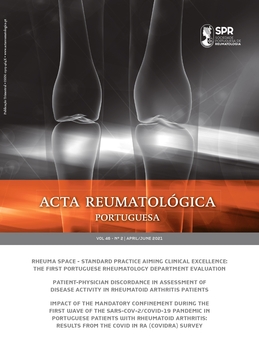Impact of the mandatory confinement during the first wave of the SARS-CoV-2/COVID-19 pandemic in Portuguese patients with rheumatoid arthritis: results from the COVID in RA (COVIDRA) survey
Authors
Filipe C. Araújo; Nuno Pina Gonçalves; Ana Filipa Mourão;
Objective. The aim of this study was to evaluate the self-reported impact of mandatory confinement occurring in the first wave of the SARS-CoV-2 pandemic in Portuguese patients with rheumatoid arthritis (RA), as a means to improve care during this and in future pandemics.
Material and methods. The web-based survey COVIDRA was developed to assess 5 domains including RA symptoms, attitudes towards medication, employment status, physical exercise and mental health. The questionnaire was sent to RA patients through e-mail and social media of the Portuguese Society of Rheumatology and two patient associations; and it was filled locally at two rheumatology centers in Lisbon. Recruitment took place during June and July 2020.
Results. We obtained 441 valid questionnaires. Most respondents were female (88.4%), caucasian (93.6%) with a mean age of 58 years. The majority had disease lasting >10 years and were treated with csDMARDs (63.2%) and/or bDMARDs/tsDMARDS (23.7%). Over 40% experienced symptom worsening during confinement, almost half considered moderate or severe. Mobility restriction and increased stress, anxiety or depression were responsible for this worsening. Only 2.5% reduced or withheld their immunosuppressive medication due to fear of becoming infected with SARS-CoV-2. After confinement, 16.2% of those previously employed were in a lay-off regime and 3% lost their jobs. Most employed RA patients practiced telework during confinement. The majority of patients decreased or did not practice any physical exercise (80.5%). Symptoms of anxiety and depression developed or worsened in 67.3% and 51.9% respectively, approximately one third were considered moderate or severe.
Conclusions. Portuguese RA patients experienced significant symptom worsening, anxiety and depression during the first wave confinement. Only a minority changed their immunosuppressive treatment for fear of SARS-CoV-2 infection. Published literature on these matters shows results very similar to ours.
Filipe C. Araújo
Rheumatology and Osteoporosis Unit, Hospital de Sant'Ana, SCML
Nuno Pina Gonçalves
Department of Rheumatology, Centro Hospitalar de Lisboa Ocidental EPE – Hospital de Egas Moniz
Ana Filipa Mourão
Department of Rheumatology, Centro Hospitalar de Lisboa Ocidental EPE – Hospital de Egas Moniz
Rheumatology and Osteoporosis Unit, Hospital de Sant'Ana, SCML
Nuno Pina Gonçalves
Department of Rheumatology, Centro Hospitalar de Lisboa Ocidental EPE – Hospital de Egas Moniz
Ana Filipa Mourão
Department of Rheumatology, Centro Hospitalar de Lisboa Ocidental EPE – Hospital de Egas Moniz





